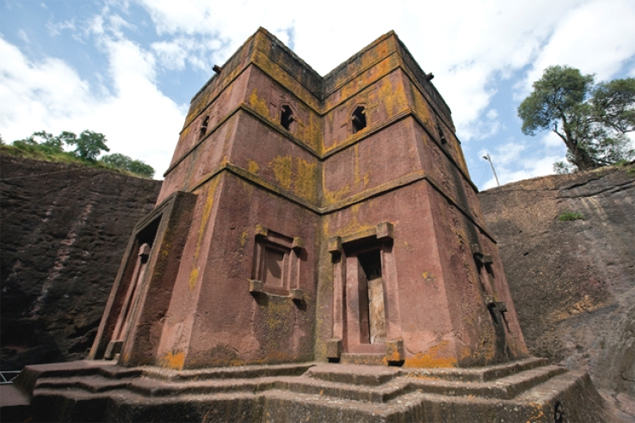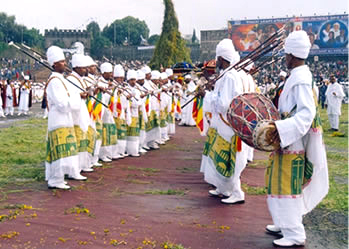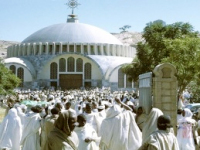Heritage recognition, weak marketing

Addis Ababa, Ethbiopia - For Teruneh Mengesha, a retired civil servant, his memory of the first heritage recognized by the United Nations Educational, Scientific, and Cultural Organization (UNESCO) in 1978 has not yet faded out.
Yet, again, he was thrilled when he heard that his country had succeeded in getting recognition for its first intangible heritage a month ago. Now, his country tops the continent and finds itself amongst the countries that have more heritages recognized by UNESCO. However, he is hardly sure that he knows much about this success, not unlike many of his fellow citizens. “I think it generates income for the tourism sector,†he replies when asked whether he is aware of the success. Apparently, this is somewhat an aggregate response of the public who feel proud when having more UNESCO registered heritages and also hope that there will be more heritages to get registered in the future.
 When Habteselassie Tafesse, who is popularly known as the father of Ethiopian tourism, founded the tourism commission in 1961, many were not well aware of what he wanted to do then. With his vigorous dedication and passion he realized the essence of tourism in his country for the first time, with a country with ancient history, immaculate culture, and so many tangible and intangible heritages opening its door to tourists and globetrotters. The phrase “Thirteen Months of Sunshineâ€Â, coined by the man who dedicated his life to tourism by referring to the calendar that differentiates the country from the rest of the world, hugely contributed towards the success in promotion and marketing. As a result, the country’s immense potential for tourism was revealed when it launched a campaign that promotes the recognition of monuments, castles, and natural resources in the global arena.
When Habteselassie Tafesse, who is popularly known as the father of Ethiopian tourism, founded the tourism commission in 1961, many were not well aware of what he wanted to do then. With his vigorous dedication and passion he realized the essence of tourism in his country for the first time, with a country with ancient history, immaculate culture, and so many tangible and intangible heritages opening its door to tourists and globetrotters. The phrase “Thirteen Months of Sunshineâ€Â, coined by the man who dedicated his life to tourism by referring to the calendar that differentiates the country from the rest of the world, hugely contributed towards the success in promotion and marketing. As a result, the country’s immense potential for tourism was revealed when it launched a campaign that promotes the recognition of monuments, castles, and natural resources in the global arena.
War and conflict in the late 1970s and 80s have dragged the tourism sector since tourists were alert that the environment was unsafe. However, in spite of all the attractive aspects the country has had since the mid-90s, the tourism sector has not seen such a remarkable success, commentators say. Nevertheless, registration of heritages has been a success story and that is why people are often questioning what the merit the country will finally have in registering heritages. While many think more registered heritages would bring more tourists, others assume that the image of the country would positively change.
In fact, having such recognized heritages means having many more advantages. Perhaps because of this, other countries like Kenya and Tanzania in the region have a pretty huge number of visitors with a few universally recognized heritages every year. Kenya, which had some 15 million arrivals in 2012, is considered to be the regional power-house of tourism, placing itself in the second most dominant category on the continent. To the contrary, Ethiopia, which tops the continent by having some ten universally recognized natural and cultural tourism products, had never had a number exceeding one million, according to an expert in the industry. Of course, there is no report in the World Tourism Organization regarding the list of arrivals provided from Ethiopia for various reasons for counter-checking.
 Meskel, a festival of the Finding of the True Cross has been one of the intangible spiritual heritages that sought recognition in the category of festivities and living expressions for years. A month ago news came from the 8th conference of intangible cultural heritages marking the inscription of the ancient national festival of Meskel. This came a couple of years after the country succeeded in winning recognition for the first for an agricultural terrace in Konso in the south. This seems to be a more promising step forward for the country as any ordinary citizen could imagine, and shall be the same with others too. However, the situation is different. Tour operators say that less is being done to promote the smokeless industry and often talk about the importance of promotion. Read more
Meskel, a festival of the Finding of the True Cross has been one of the intangible spiritual heritages that sought recognition in the category of festivities and living expressions for years. A month ago news came from the 8th conference of intangible cultural heritages marking the inscription of the ancient national festival of Meskel. This came a couple of years after the country succeeded in winning recognition for the first for an agricultural terrace in Konso in the south. This seems to be a more promising step forward for the country as any ordinary citizen could imagine, and shall be the same with others too. However, the situation is different. Tour operators say that less is being done to promote the smokeless industry and often talk about the importance of promotion. Read more



